Choose a Healthcare Mobile App Development Company in the UK
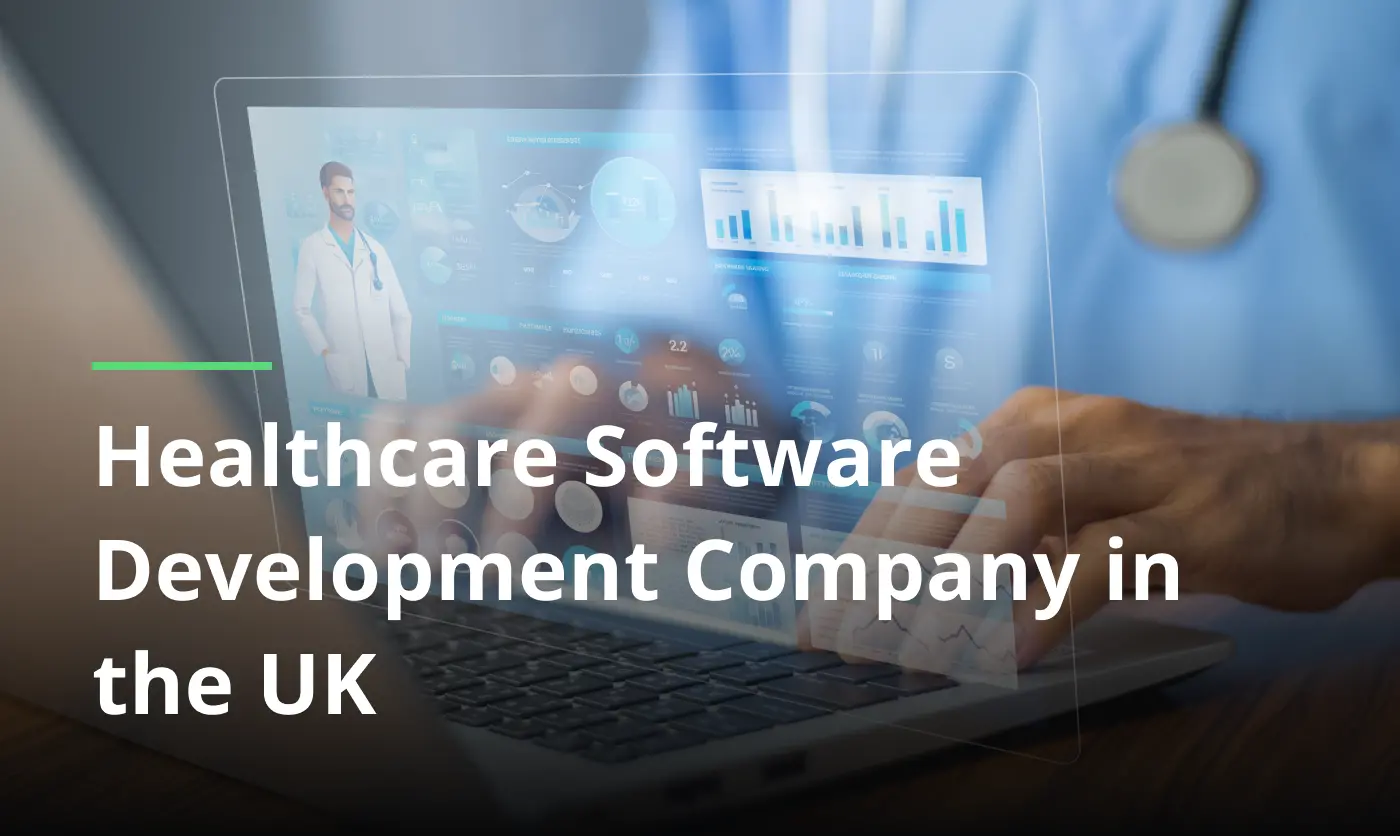
The UK medical sector is moving at full steam technologically and financially (expected to reach £20.93 bn by 2031), making the task of selecting a healthcare software development company challenging. We’ve meticulously researched 200+ firms, made an evaluation of their offerings across skills and case studies to present a catalogue of the best ones.
To simplify the process of choosing providers of custom healthcare software development services, our experts compared a list of the top 10 providers by 4 criteria and revealed what makes a software development company in the UK dependable and highly competent.
As a result of comparing numerous options among healthcare software development companies, you get a well-researched review covering selection, comparison, questions and prices. Proceed with our guide to find a partner in the UK capable of building software that works like a steady heartbeat and grows with your organisation.
List of UK-based healthcare software development companies
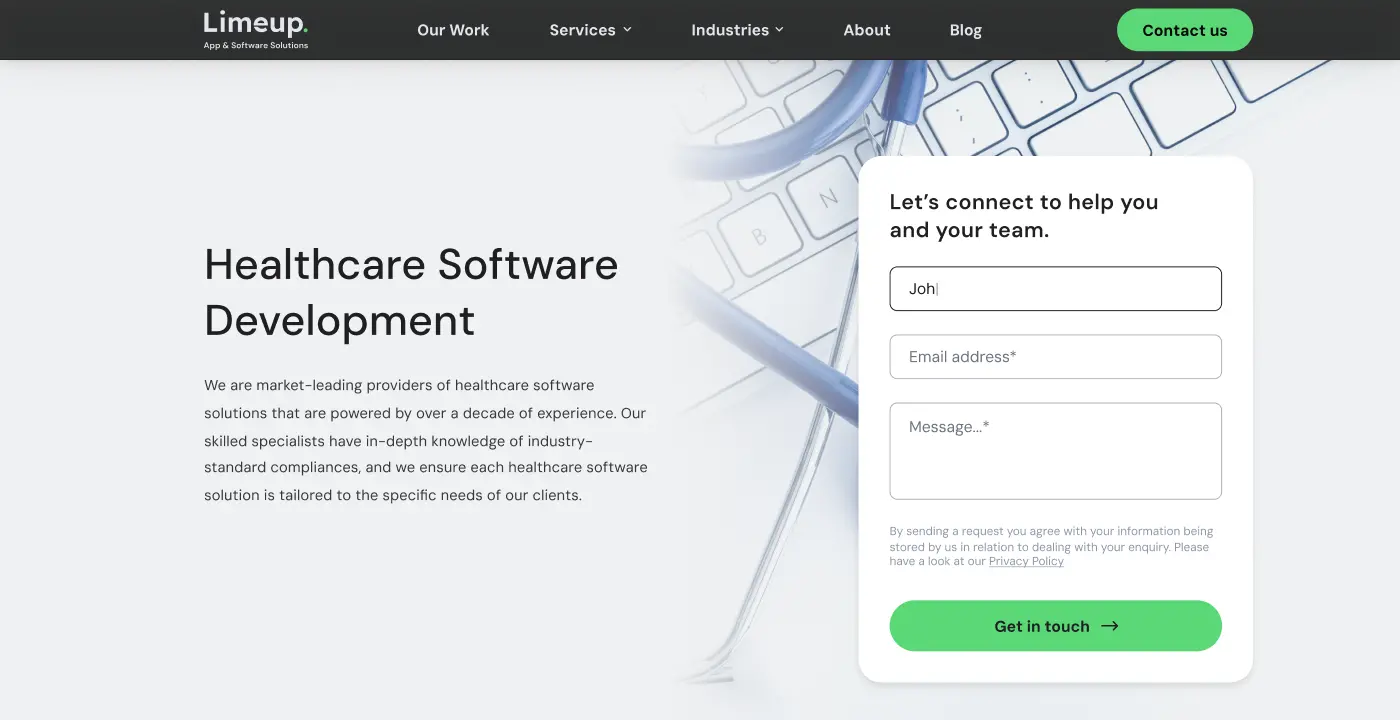
Founded: 2017
Headquarters: London, United Kingdom
We are a leading custom healthcare software development company and a trusted technology partner for hospitals, clinics and medical startups. Over 200 projects and a 95% client return rate reflect our ability to craft medtech software that adds real value and stands the test of time.
At the core of our work is listening to our customers. By putting ourselves in our clients’ shoes, we develop bespoke plans that account for every technical and regulatory need in the medical space.
Key services:
Industries:
Why choose us:
Thanks to Agile methodology, our clients get iterative demos so progress is visible at every step of the way. We specialise in creating scalable and secure healthcare programs and mobile iOS and Android applications that enhance patient engagement (up to 3x growth) and clinical workflow optimisation.
Select case studies:
- Our creation, Mentalio, is a mental health app to help the user cope with depression, stress, anxiety using meditations, breathing exercises, mood management, and journaling with the help of AI. Consequently, our privacy-oriented architecture that is modular in nature, increased engagement by 72% and decreased drop-off by 58%.
- In the case of Apontis, our solution minimised human errors by 45%, shortened the time to create manual reports by 80%, and delivered 99.99% platform uptime in clinics and research centres.
- Take a look at the full catalogue of works.
Jelvix

Founded: 2011
Headquarters: London, United Kingdom
The Jelvix, as a reliable provider of healthcare software development services, has a 15-year of experience coupled with in-depth knowledge in the industry to provide innovative solutions that are regulation-compliant. It simplifies medical complexities among both the HIT service firms and the innovators by developing intelligent systems that advance care and unlock the value of data.
Key services: Enterprise software development, AI development, dedicated team, mobile app development, QA and testing.
Industries: Healthcare, financial services, retail, media, logistics, automotive, real estate, insurance.
Why choose them:
Jelvix has more than 450 experts in the field of development, QA, design, and cloud engineering, which makes it a strong technology partner. Healthcare providers seeking robust, regulation-adherent platforms enriched with AI, IoMT and predictive analytics will benefit from Jelvix’s competence.
Select case studies:
In a wide variety of client deals, Jelvix has provided enterprise EHR/EMR systems, telemedicine tools, practice management systems, patient portals, chatbots powered by AI, digital therapeutics, as shown in its portfolio examples.
Empat
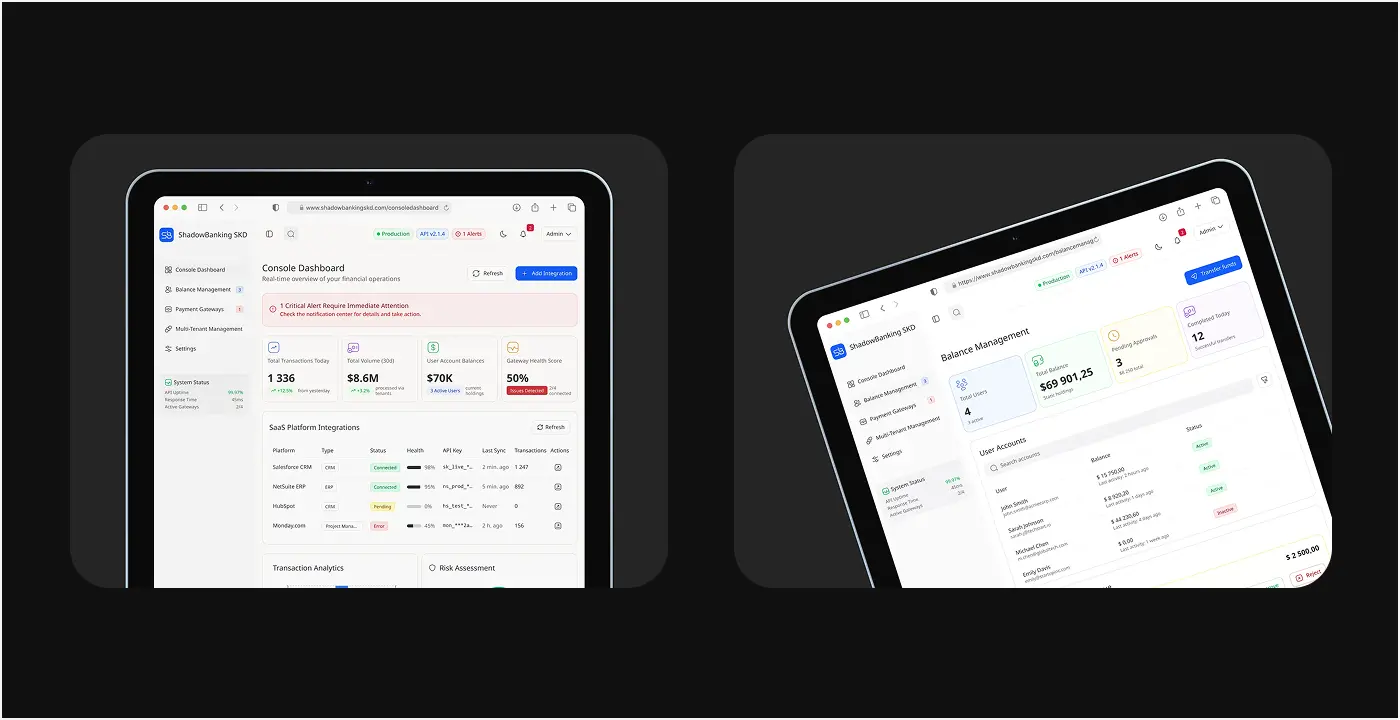
Founded: 2013
Headquarters: London, United Kingdom
Dedicated to the custom medical software development services, Empat provides clinics, startups, and health technology firms with solutions that optimise procedures, maximise productivity and enhance patient welfare.
Key services: Software development, SaaS engineering, tailored website creation, staff augmentation, product validation.
Industries: Healthcare, education, fintech, social networks, eCommerce.
Why choose them:
This agency is a combination of research, passion, technical expertise to develop software in healthcare that advances patient care and clinical performance. The active involvement and the sustained collaboration allow software to respond to the changing clinical environments.
Select case studies:
Managing 300+ projects in 17 countries, their UK portfolio consists of HIPAA-compliant portals, mental health apps, telemedicine, and EHR platforms designed to create a simplified workflow and quantifiable outcomes.
Light IT Global

Founded: 2006
Headquarters: Kensington, United Kingdom
Light IT is a leading force in the group of custom healthcare software development companies that reinvent health business ventures and help reshape digital health ventures with smarter, faster, and more intuitive medtech solutions
Key services: Software engineering, dedicated teams, software audit & consulting, maintenance & support, AI/ML.
Industries: Healthcare, finance & banking, education, transportation & logistics, HR & recruiting, media & entertainment, on-demand services.
Why choose them:
An extraordinary level of employee engagement and excellence in project delivery is indicated in a team that is led by 30+ certified processes and experts who maintain an impressive level of eNPS at 78.
Select case studies:
Their portfolio of works highlights endeavours like a migraine-tracking app for a Singapore client with over 3M users worldwide, process-automation tools that tripled operational functionality for a biotech giant Pfizer, and a web-based system helping a Swedish health tech startup improve accuracy in cancer genomics.
Imobisoft
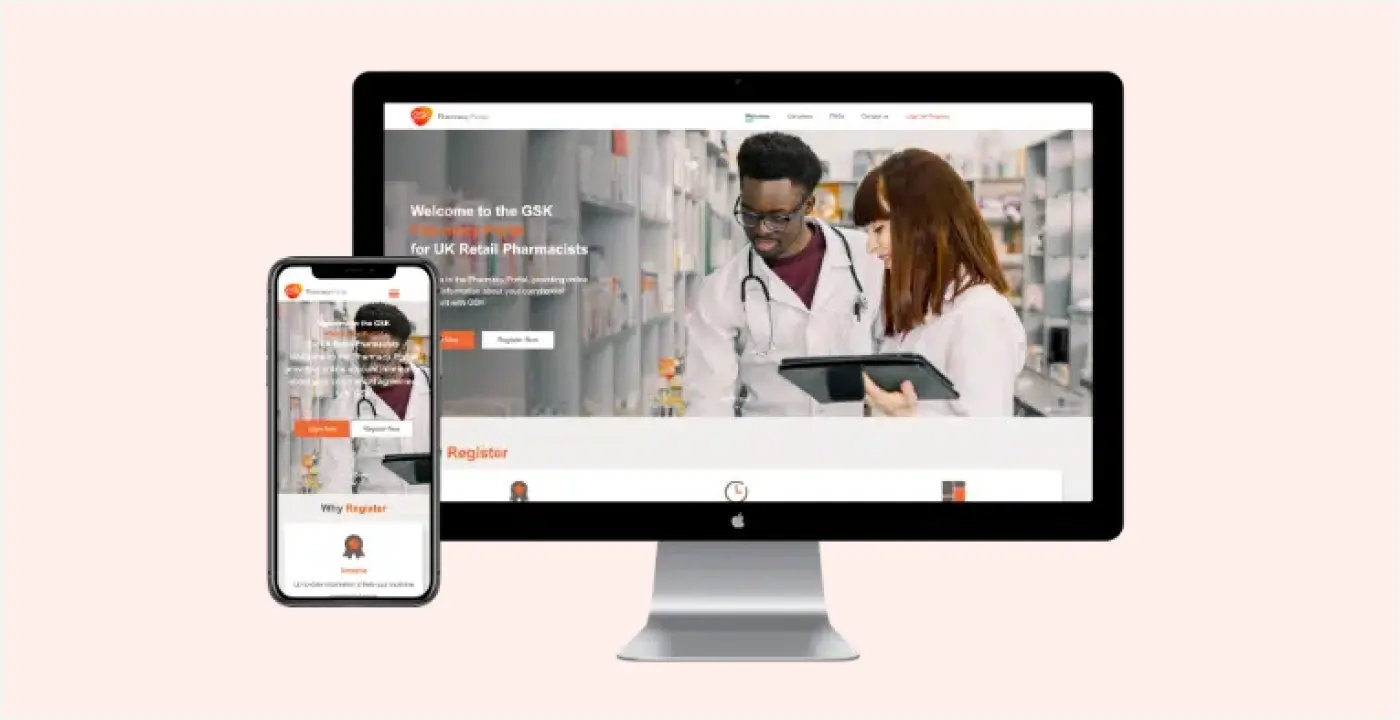
Founded: 2007
Headquarters: Coventry, United Kingdom
The next on our list is a custom medical software development company that has 15+ years of experience designing AI-driven platforms and digital health systems. It is also known for advanced analytics, automation, and intuitive design, assisting in modernising care delivery, reducing inefficiencies and supporting better treatment journeys.
Key services: App and software creation, AI strategy and consulting, AI solution design, machine learning, bespoke business applications.
Industries: Health and pharma, manufacturing and engineering, news and media, technology utilities.
Why choose them:
Imobisoft brings together 170+ engineers and advanced AI capabilities to support organisations such as the NHS, GSK and the Disability Living Foundation. Their crew is able to turn intricate healthcare challenges into dependable, compliant digital ecosystems.
Select case studies:
On their page with success stories, we can see that Imobisoft built solutions that empower therapists with automated reporting, support families with accessible digital health checks and transform pharmacy operations into transparent, user-friendly experiences.
3 Sided Cube
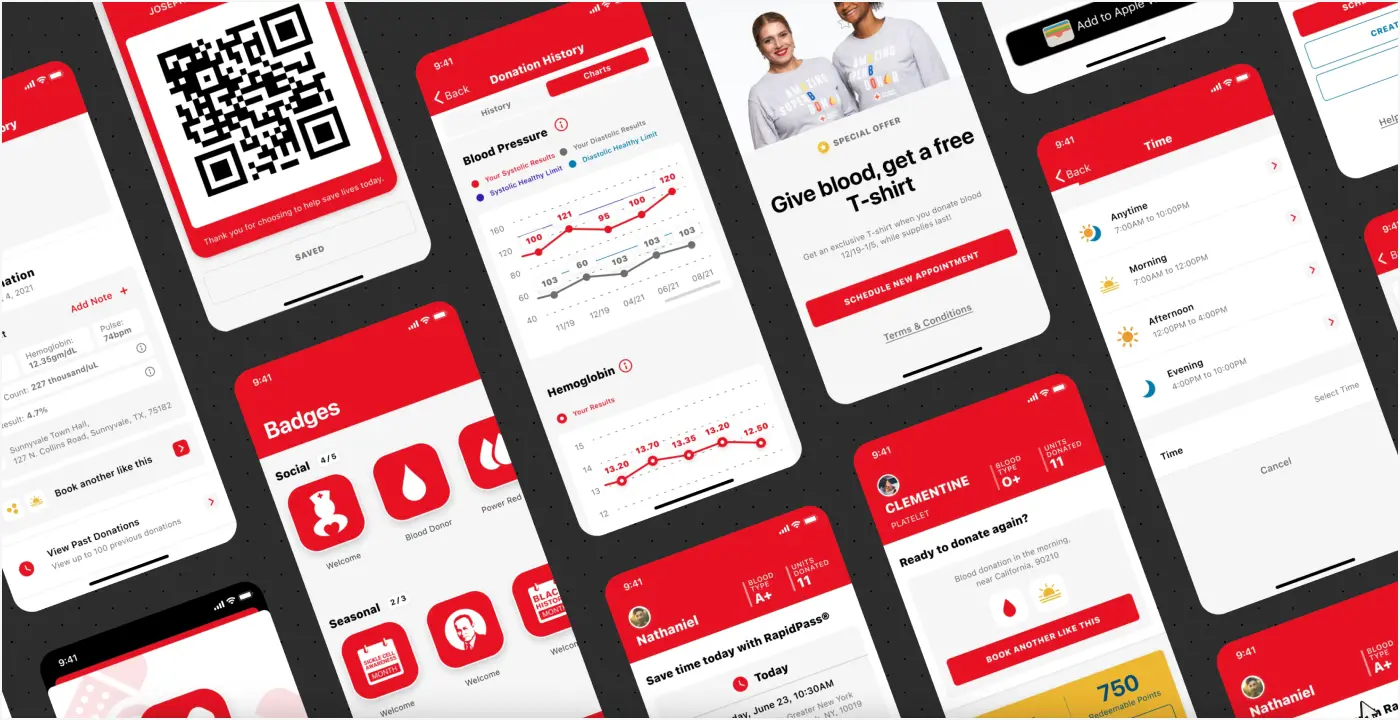
Founded: 2007
Headquarters: Bournemouth, United Kingdom
3 Sided Cube is a medical software development firm with a clear mission: building technology that used by NHS and Red Cross. Life-saving health apps and platforms for global climate initiatives illustrate their commitment to creating tools that shape brighter futures.
Key services: Custom software creation, mobile app development, AI consulting, web platform development.
Industries: Healthcare, disaster response and emergency, climate action and environmental conservation, education, coaching.
Why choose them:
Anchored in open collaboration, user-centric design, and smart AI integration, the team engineers software, apps, web platforms and AI-powered workflows that marry technical sophistication with real-world impact.
Select case studies:
They have a project anthology that made a difference in the journeys of blood donation, mental health support, childcare, emergency response and planetary health tracking.
JetBase

Founded: 2014
Headquarters: Wangford, United Kingdom
A healthcare software product development company where data, design, and AI meet and improve patient care. Bringing bold ideas to real-life and reliable digital solutions, JetBase refines the everyday work of clinicians and patient encounters.
Key services: Custom software development, MVP engineering, SaaS creation, web and mobile app development, LMS, UI & UX design.
Industries: Healthcare, Apple Vision Pro, AWS, education, retail, media & entertainment, Fintech, HR, EHR & EMR, serverless application.
Why choose them:
JetBase is a 10-year-old studio with more than 60 successful projects in the market globally in 10+ countries. Their focus on a clear roadmap, nimble organisational teams and execution are signified by an 8.4 Net Promoter Score and repeat clients.
Select case studies:
Within their catalogue of works, telemedicine applications, mobile health systems, cloud-optimised applications depict how innovation and tangible impact are connected in fast-tracked processes and interactions in the sectors.
Satva Softtech

Founded: 2015
Headquarters: Stanmore, United Kingdom
This healthcare software development services company embraces the strength of the Agile method and human-centred design to create software that really enhances patient pathways. Their work assists clinicians, hospital staff and patients to manoeuvre through the system’s complexities with confidence and ease.
Key services: Software development, web and app creation, Odoo ERP implementation, business process automation, Dynamics 365 implementation.
Industries: Manufacturing, healthcare, finance, eCommerce, logistics, wellbeing.
Why choose them:
Their hybrid-shore strategy and flexible practice align productivity, clarity and innovation, and deliver secure and user-friendly systems that win the trust of clients and high Net Promoter Scores.
Select case studies:
The achievements portfolio features projects, such as a clinical trial management system and medical device software migrations, to demonstrate the ability of Satva Softech to combine compliance and user-centric design.
VTS Software

Founded: 2007
Headquarters: Manchester, United Kingdom
VTS Software is a healthcare software development firm with a mixture of good technical and user focus and hence develops software that simplifies operations, improves decision-making and optimisation of performance.
Key services: Business services, manufacturing, medical, advertising & marketing, automotive, information technology.
Industries: Healthcare, pharmaceutical, logistics, manufacturing, education, and enterprise services.
Why choose them:
Their creative application of AI, machine learning and forward-looking analytics enables clients to be predictive of challenges and achieve better results in medtech or business performance.
Select case studies:
Across their projects, this agency has provided solutions like SRDB.PRO, an enterprise-level tool for systematic reviews and data analysis, and the BMS Portal, which integrates global government initiatives and industry updates.
BGO Software
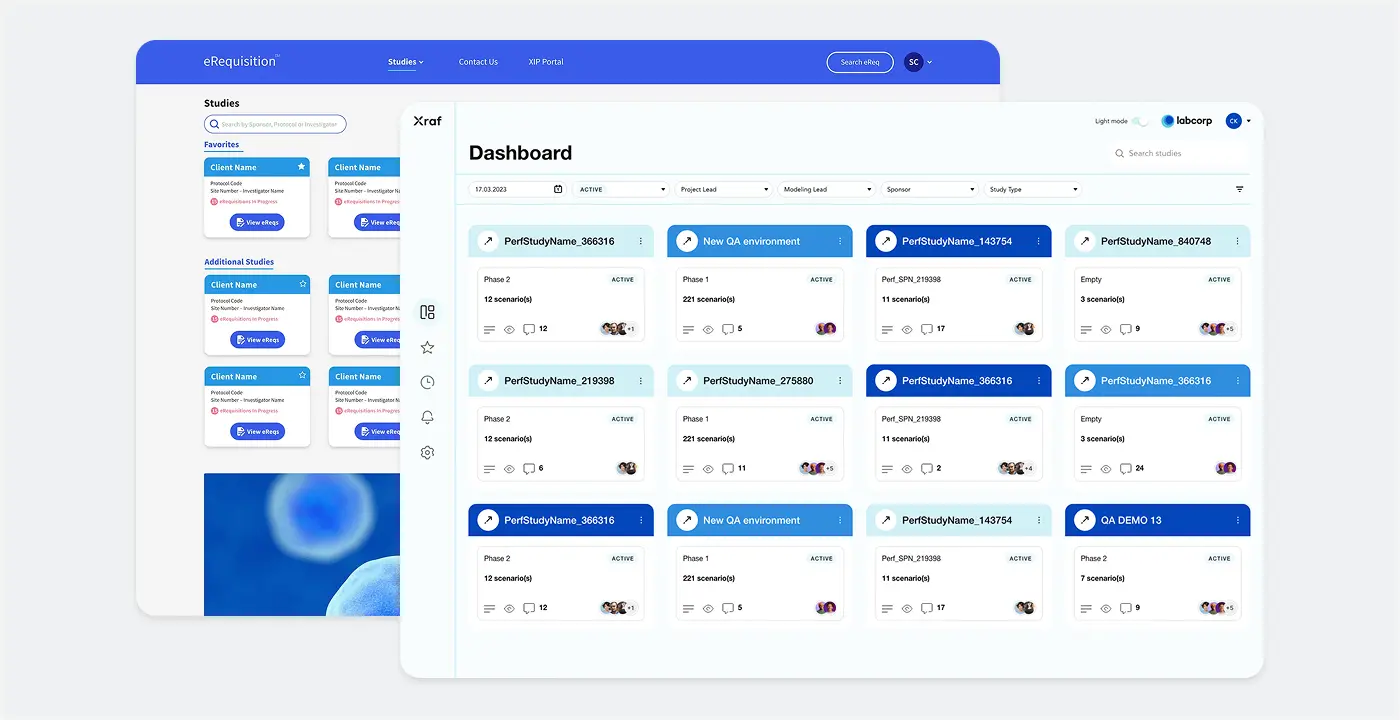
Founded: 2008
Headquarters: London, United Kingdom
The final medical software development agency on our list is BGO Software, which is focused on the digital sphere of health engineering. With a mission to bridge technology, compliance and efficiency, they help healthcare startups and HealthTech innovators transform ideas into impactful software products.
Key services: Digital readiness, CTO as a service, product development, definition and discovery, healthcare engineering team.
Industries: Healthcare, pharmaceutical, clinical research.
Why choose them:
BGO Software combines deep knowledge in medicine with 13+ years of experience, collaborating with the UK Department of Health, as well as major pharma firms. Leveraging a team of 130 experts, including 99 advanced-degree holders, they ensure technical precision, governance, and meaningful results.
Select case studies:
Through a track record of 120+ projects and partnerships with 70+ organisations, BGO Software consistently produces stable, expandable and outcome-oriented software that transforms care delivery.
What is a healthcare software development company?
A medtech software agency is a niche technology professional who specialises in the creation of digital products to meet the specific requirements of the medical field. Differing from standard IT vendors, they unite technical capabilities with knowledge of medical regulations and patient-focused design.
Medical software development companies deal with hospitals, clinics, pharmaceutical corporations, insurance establishments, health technology startups and research organisations. They simplify sophisticated medical operations, create digital platforms that are simple to use, and assist with clinical decision-making.
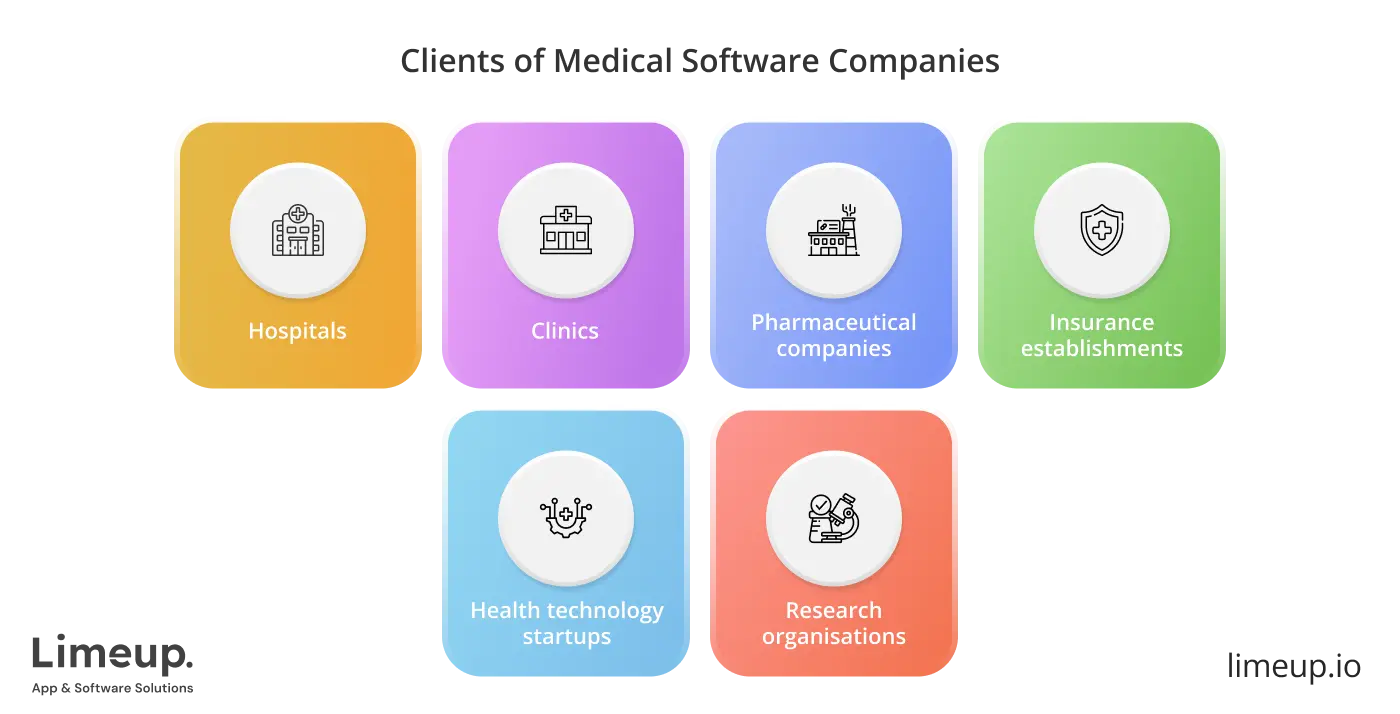
Combining recent technologies like artificial intelligence(AI), machine learning(ML), Internet of Things (IoT), and cloud computing, these firms are offering technologies that can not only address the current challenges but also create innovations in the sphere of patient care and healthcare management.
Given all these factors, the selection of a provider should be meticulous, because a perfect partner should be familiar with how to comply with high-quality healthcare requirements such as HIPAA, GDPR and local laws, ensure excellent security and standards alignment. Our guide will explain to you how to connect with such a professional.
Types of healthcare software solutions
The field of healthcare software development companies in the UK produces a great variety of offerings that meet various requirements in the medical and healthcare industry. Not all contractors cover every software option, so it’s vital to check if they can build the type of product you need.
Beyond that, understanding the extent of their capabilities will enable you to make an informed decision and choose a long-term partner that will support growth and efficiency of your operations.
These solutions may be divided into several major categories:
- Electronic Health Records (EHR) & Electronic Medical Records (EMR). EHR and EMR systems store, handle and retrieve patient records in a safe manner that helps clinicians make correct diagnoses and administer coordinated care.
- Telehealth platforms and telemedicine. Solutions allow patients to conduct a video call and chat or mobile application with healthcare professionals remotely through telemedicine. Telehealth is estimated to be worth up to approximately £560 million in 2024 and up to over £2,2 billion by 2033, which shows its wide adoption.
- Patient management/engagement software. This kind of medtech has features such as online booking of appointments, reminders, patient portals, and mobile applications giving access to medical records and treatment plans.
- Laboratory, pharmacy and imaging software. Laboratory Information Management Systems (LIMS) are used to automate test processes, pharmacy management systems are used to manage inventories and prescriptions, and imaging platforms are used to store and retrieve radiology and diagnostic images in a secure manner.
- Revenue cycle management & administrative tools. Healthcare software development firms build such systems to automate billing and insurance claims amidst other administrative functions. They enhance efficiency in the operations and minimise errors.
- New technologies: AI, IoT and analytics. These solutions, powered by AI, IoT, and analytics, help track patient health, predict treatment outcomes, enable preventive care, reduce hospital readmissions, and optimise resources.
When evaluating suppliers, look at their services and industries pages on their websites to find detailed information about their offerings.
Comparing medical software development companies in the UK
With a clear vision of what a UK medical technology partner is, our comparison will cover several persistent problems, such as team size, scope of projects, costs and ratings.
The information we present below is based on official websites and LinkedIn profiles, customer reviews on Clutch, GoodFirms, Trustpilot and social media presence, which gives a comprehensive overview of the picture to make the decision.
Team size
Obviously, larger healthcare software contractors tend to be more flexible, such as having dedicated teams, staffing on demand, and scaling quickly. They are able to work on several projects at once, deal with complex integrations with EHR/EMR systems, and offer backup resources in case the deadlines are short.
Smaller teams, conversely, tend to imply quicker decision-making and closer cooperation and also more individualised care. When the work has extremely specialised needs or projects that require rapid iterations, a small, agile team can prove beneficial to the client.
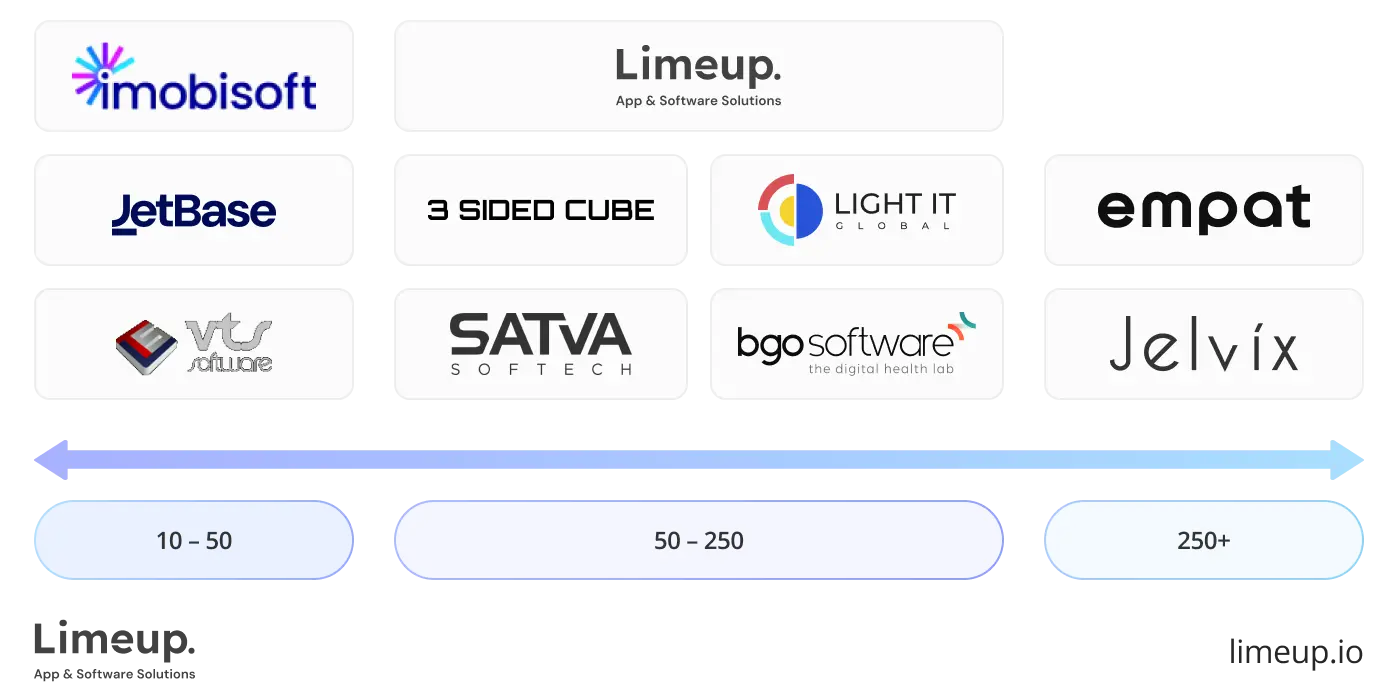
Projects
After examining hundreds of project portfolios, our analysts spotted clear patterns: agencies with 200+ deliveries run like seasoned pilots, steady and precise, while those under 100 thrive on agility and hands-on innovation: two different gears driving success.
In the end, it’s horses for courses — the right fit depends on how fast you want to fly and how smooth you need the landing to be.
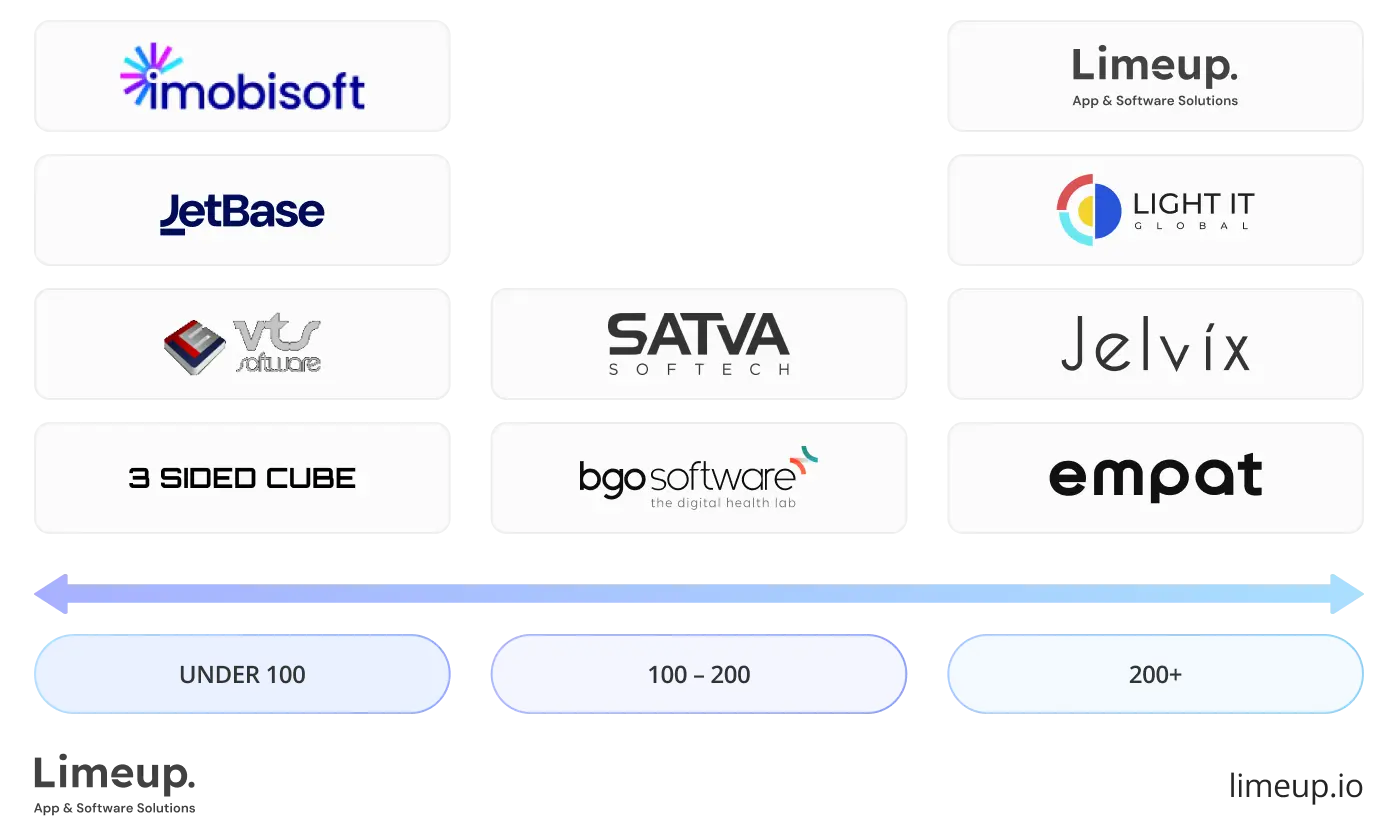
Cost
The pricing is based on seniority, geographic location of the development team and the complexity of the services offered.
Although smaller software development companies in the UK can offer more affordable options that would benefit MVPs or startups, larger providers with a bigger healthcare background can offer more options at a higher cost in the form of enterprise-level software, security audits, and continued compliance.
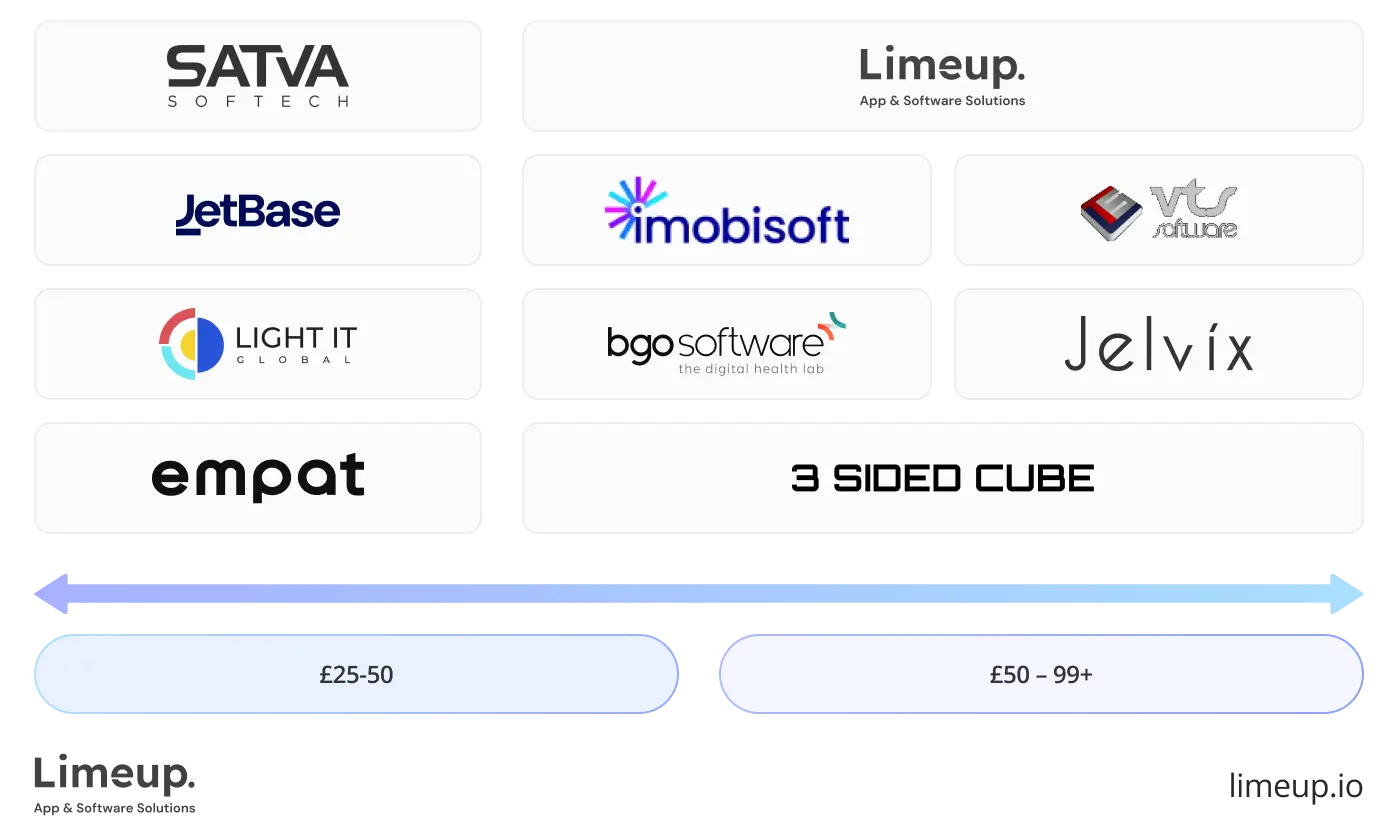
Rating
Client feedback gives us an idea of the actual performance in the real world, not the ideas of marketing. The good ratings of healthcare software development agencies usually indicate good delivery, clear communication and punctual project completion.
Detailed testimonials are also worth analysing to observe how the vendors address such issues as conformity with regulations, integration with hospital systems or multi-facility scaling software.

To sum up, we need to mention that the suppliers we compiled each bring unique strengths, from AI-driven diagnostics and telehealth platforms to patient engagement tools and clinical workflow automation. The choice of the correct partner is based on the alignment of their knowledge, technologies, and client orientation with the peculiarities of your healthcare project.
How to select a medical software development company?
The current digital development is being reflected in the healthcare SaaS market in the UK, which grows by nearly 20% annually, with organisations investing in more and more purpose-built, data-driven platforms. It is vital to opt for an experienced team that will empower you to deliver high-quality, competitive services.
The process of selecting the appropriate healthcare software development company in the UK with whom to create medical software is not entirely a technical choice. It has a direct effect on patient care, standards alignment, and scalability in the long term. We have compiled the following as the main criteria to be considered when evaluating potential firms.
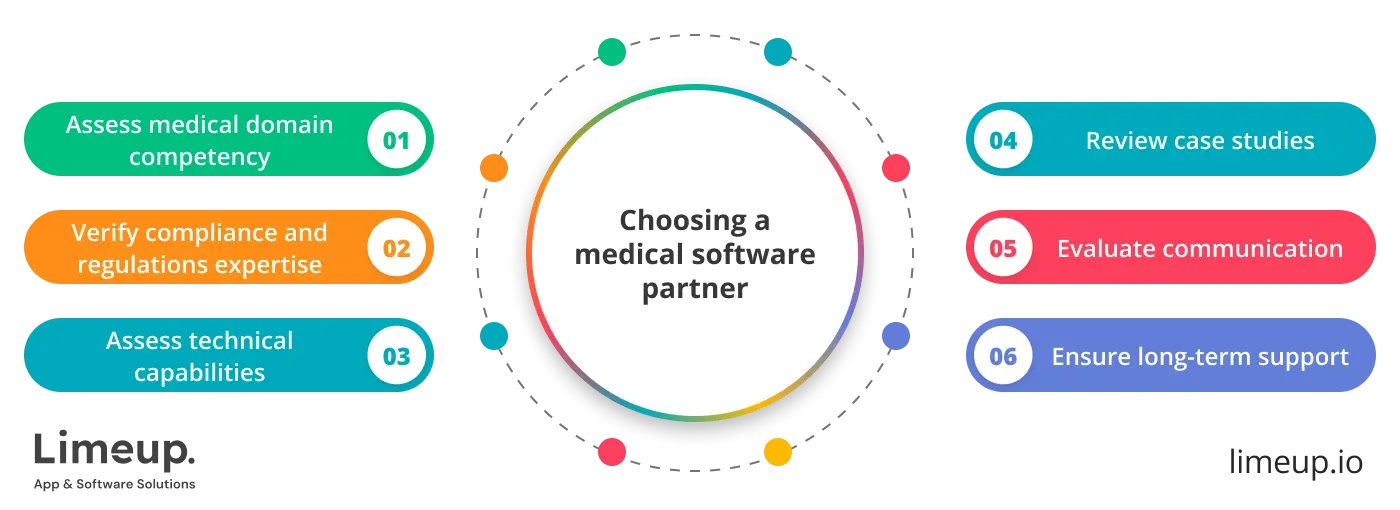
Assess medical domain competency
Search agencies that have a successful history in healthcare initiatives, e.g. telemedicine platforms, EHR/EMR systems, clinical trial solutions, or patient engagement apps. A partner that has insight into healthcare workflow, data privacy issues and interoperability requirements will save you time and prevent expensive errors.
Analysts estimate the world digital health market as over £513 billion this year, i.e. companies that are developing in this field should be ahead of stringent interoperability, security and UX needs. And since 75% of leaders in healthcare are moving toward Generative AI adoption, working with a team that combines medical and technical proficiency is no longer optional.
Verify compliance and UK regulations expertise
The structures that the firm should be familiar with include HIPAA (US), GDPR (EU), HL7 and FHIR. Assure that they develop a product that encrypts software end-to-end, implements role-based access controls, and uses secure cloud infrastructure.
The Information Commissioner’s Office (ICO) revealed that more than a quarter of data breaches within the healthcare sector were associated with mishandling of personal data, which had to be developed with a focus on compliance. Find a group that employs end-to-end encryption, role-based access control, and FHIR/HL7 standards of integration.
Assess technical capabilities
The medical software development company must be able to offer:
- Bespoke software creation for specific clinical needs such as telemedicine or diagnostics.
- Knowledge in integration with current systems (EHR/EMR systems, lab platforms, and hospital databases).
- Proficiency in big data, AI, and IoT, enabling advanced analytics and predictive healthcare. The NHS already supports AI adoption through its AI in Health and Care Award, driving innovation in diagnostics.
- Auto-scalable applications in the cloud infrastructures such as AWS, Azure, or Google Cloud, essential as global healthcare data volume is projected to exceed 2,300 exabytes by 2030.
The right team thinks like inventors and builds like engineers — creating software that grows stronger, not shakier, with every new user.
Review case studies
Case studies are a reflection of performance. They should not just state that they have created applications, but rather show quantifiable results: decreased administration time, higher patient satisfaction or reduced readmissions.
Request measurable metrics when looking back at the past projects and ask how the company has tested the clinical usability, whether by pilot testing, physician interviews or clinical trials on the patient. The best indicator of reliability is real-world validation.
Evaluate communication
Medical initiatives usually include several stakeholders: clinicians, administrators, IT teams, and, in some cases, patients. For digital health initiatives to be successful, these groups need to interact well with one another. Research shows that up to 80% of major adverse events in healthcare are caused by poor communication, which is a major contributor to avoidable medical errors.
Your development partner should be in a position to communicate effectively, adapt to feedback and even work beyond the time zone in case of necessity. A similar mindset and values are equally important as technical skills.
Good partners employ rigorous feedback loops, open reporting, and agile processes that are open to clinical contributions. The collaborative process will make sure that your digital product has a reflection of the real hospital processes, not merely a technical checklist.
Ensure long-term support
Software development in medicine does not stop at the deployment stage. There are changes in technologies, health policies and new cyber threats. Digital health systems will need significant changes within 3 years of their introduction because of regulatory or technological changes.
The long-term support implies additional upgrades, security and performance checks, and the ability to scale the architecture to support higher volumes of patient data. Constant upkeep is what separates software that becomes bigger with your healthcare institution and software that goes outdated in several years.
A loyal UK healthtech vendor will guarantee you lifecycle management to keep your system up to date, efficient, and future-proof so that your medical processes run smoothly as healthcare enters its next digital era.
Mistakes to avoid when choosing a healthcare software vendor
We’ve seen firsthand how a misaligned collaboration can slow workflows, compromise security, and drain resources before a single line of code is even deployed. This issue is mirrored in estimates given by McKinsey that 45% of IT projects are over their budget because of the poor information and unclear expectations.
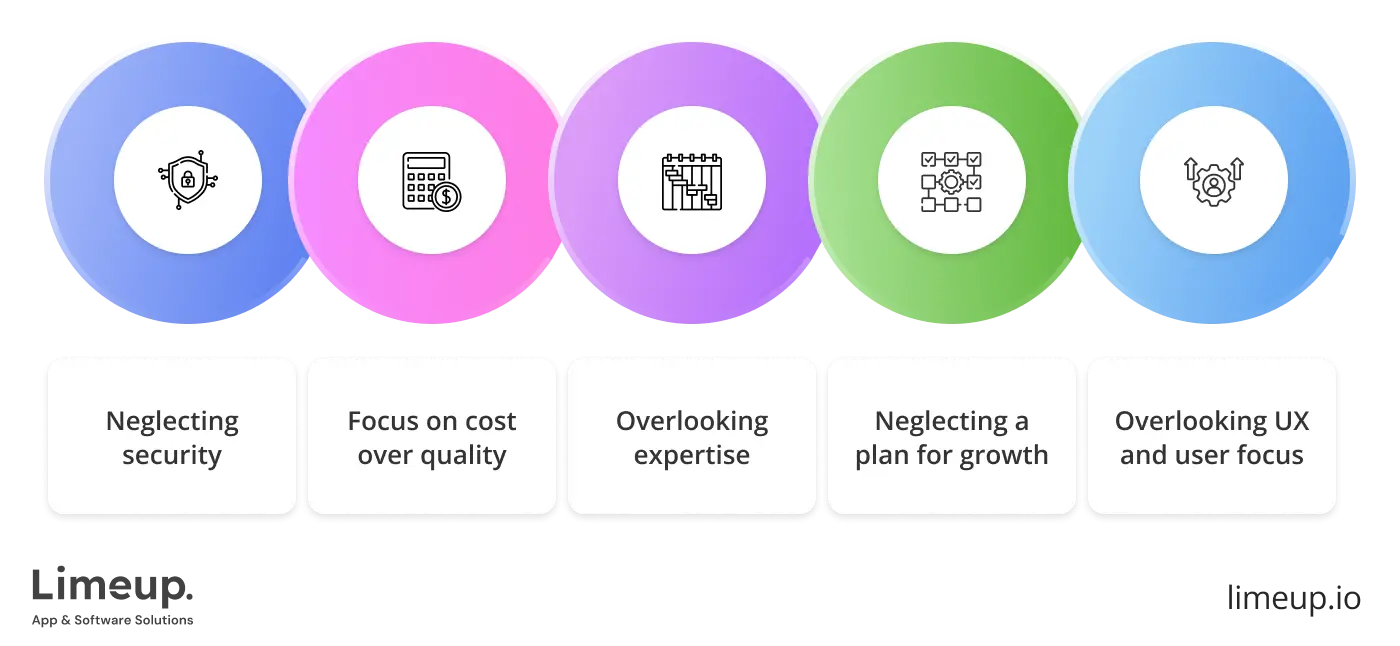
- Overlooking security standards. Solutions in healthcare should also be in line with the rigid rules as HIPAA, GDPR and HL7/FHIR. Selecting a vendor with a history of insecure and non-compliant system construction may put your practice at risk of data breaches and penalties, as well as damage your reputation.
- Emphasis on low cost rather than quality. Low bids may be tempting, but in most cases, the bid will be associated with unknown costs, unrealistic schedules or poor quality of the product. An established software and mobile app development company in the UK provides a definite cost outline, is transparent, and justifies spending by quality assurance means.
- Ignoring domain expertise. Generic software companies might not have the insight into medical processes, patient journeys, and interoperability needs. An organisation that specialises in clinical programming is already aware of the traps of EHR-related connection, telehealth implementation, and compliance and transforms possible challenges into an opportunity.
- Neglecting a plan for growth. Most agencies end at the MVP level and the next thing you find is the end of the road with no real maintenance or scale solution. Your investment will be preserved by choosing a partner that promises continuous maintenance, upgrades in technologies and systems that can be expanded as you grow.
- Underestimating UX and patient-centric design. The actual quality of software in medicine is not complexity but understandability. When usability and accessibility are not put in mind, then the system will act as a stumbling block instead of a support.
Precision is all in healthcare technology. Being aware of common errors you will be able to avoid them when screening suppliers, as Benjamin Franklin once said: “An ounce of prevention is a pound of cure.”
How much do custom healthcare software development services cost?
The calculation of the investment in the development of software in the UK in the field of healthcare is not an easy task. Prices change according to the complexity of a project, the level of skills of specialists, and the strict compliance with standards such as GDPR or NHS Digital standards.
We have watched budgets range across the board and here we would present ideas about hourly prices, the scope of a project and the cost-burdens that are usually unknown even to seasoned teams.
Average hourly rates in the UK
The UK technology market provides a wide range of rates in terms of seniority, position and location of UK software companies. Balancing cost with capability ensures your healthcare software performs reliably and securely.
| Role | Hourly rate | Typical experience (years) |
| Junior developer | £40–60 | 0–2 |
| Mid-level developer | £60–90 | 2–5 |
| Senior/tech lead | £90–120 | 5+ |
| QA engineer | £45–80 | 2–5 |
| UI/UX designer | £50–90 | 2–5 |
| Project manager | £60–100 | 3–7 |
But we need to warn you: specialised medical or AI skills may cost more per hour, but significantly increase project efficiency and quality.
Besides, top medical software development companies in London will tend to be on the higher end of these scales due to demand and increased cost of living, whereas regional teams will tend to be 15–20% cheaper.
The UK is usually more expensive than Eastern Europe or South Asia; however, it is cheaper than the US market, where senior rates may cost more than £150/hour.
| Region | Typical senior rate | Typical project cost (approx.) |
| UK | £90 – 120 | £40,000 – £100,000+ |
| Eastern Europe | £40 – 70 | £25,000 – £60,000 |
| South Asia | £25 – 50 | £15,000 – £40,000 |
| United States | £120 –150+ | £70,000 – £150,000+ |
Typical project costs in the UK market
Healthcare projects are either small or big, as you already know, yet some average scales are used to demonstrate what to expect:
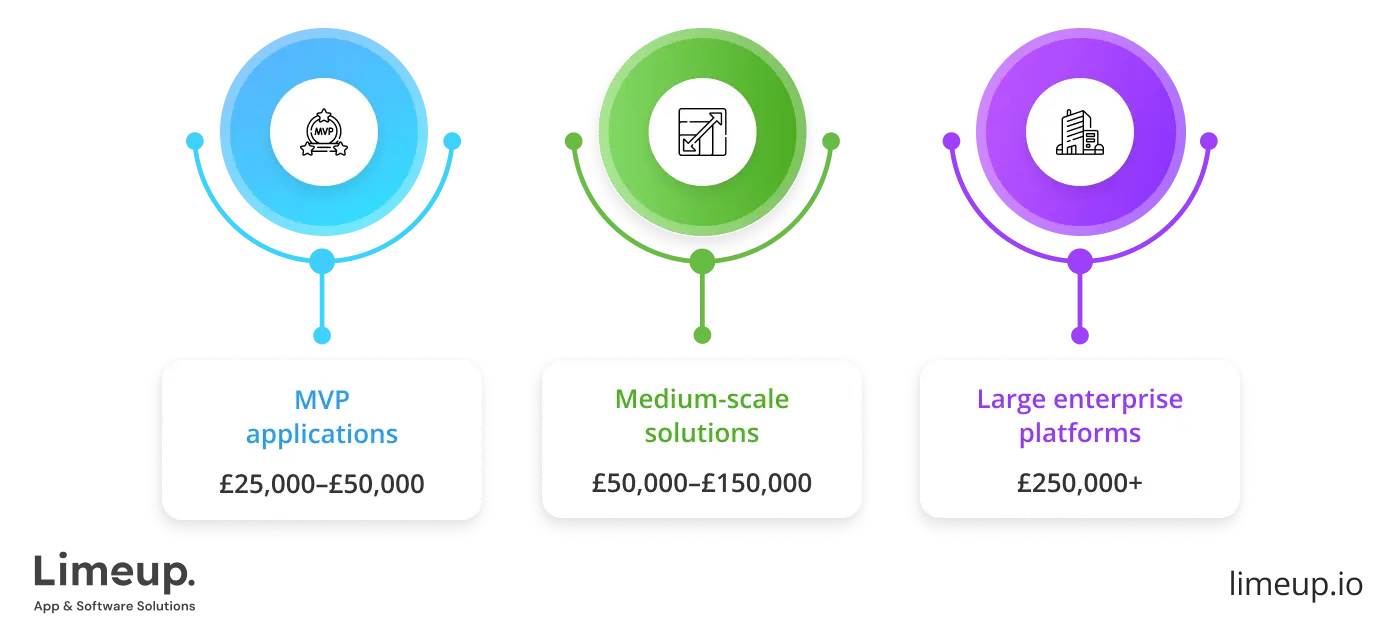
- MVP applications (telemedicine chat, symptom checker): £25,000–£50,000. These can be used in a rapid prototype version of ideas, which are lean and testable.
- Medium-scale solutions (EHR systems, NHS Digital integrations, appointment platforms): £50,000–£150,000. Secure integrations, custom workflows and compliance audits increase the costs.
- Large enterprise platforms (nationwide hospital networks, AI-driven diagnostic tools): £250,000+. The projects require lengthy development processes, high-rank security, sophisticated analytics, and multi-user controls.
The duration, NHS APIs required (number of integrations), wearables required (number of devices), or third-party systems required (number of devices) are all defining factors in the final cost.
Hidden costs
Healthcare software budgeting does not conclude with the development. There are also other costs that are not readily apparent to new entrants in the industry:
- Licensing and compliance audits. Managerial supplies, credentialing and regulatory evaluations may cause a steep rise in expenses.
- Post-launch support & updates. Medical-grade systems have to be continuously maintained, patched and have features evolve.
- Infrastructure and hosting. Recurring costs are added in the form of cloud servers, data storage, and APIs with medical interfaces.
- Training & documentation. Onboarding of the staff members, user manual, and procedure documentation make safe adoption and long-term usability of the process.
By including these costs in advance, budget overruns can be prevented, and the software will be secure, compliant and functional long after its release. Pay attention to vendors who are transparent in their outlay calculations.
What to ask when evaluating a healthcare software development agency?
The wrong collaborator can result in delays, non-compliance, or products that fail to meet the needs of clinicians and patients. We compiled some questions to ask upfront, helping ensure clarity, alignment, and a strong foundation when you hire software developers for a successful collaboration.
Questions about healthcare expertise
Before committing to a vendor, it’s essential to understand their track record in the healthcare sector and how well they navigate industry-specific challenges.
- What is the number of healthcare projects that you have completed?
- Could you give an example of platforms with EHR/EMR integration, telemedicine or patient management?
- Have you dealt with regulatory policies such as HIPAA, GDPR, or other local healthcare compliance policies?
- How do you ensure your solutions align with clinical workflows and patient care standards?
- Can you demonstrate measurable outcomes or improvements from previous healthcare projects, such as increased efficiency, patient engagement, or compliance?
Questions about the development approach
A capable partner should demonstrate strong technical skills and a clear methodology for delivering results:
- Which programming languages, frameworks, and platforms do you specialise in?
- Have you implemented AI, big data, or IoT technologies in healthcare applications?
- What is your approach to integrating with third-party systems, APIs, or medical devices?
- Which development methodology do you use (Agile, Scrum, Waterfall)?
- Do you follow test-driven development (TDD) or continuous integration/continuous deployment (CI/CD) practices?
Questions about the project team
Projects often falter not because of ideas but because of execution. We suggest you check the team’s composition, know-how and team dynamics to hit deadlines and pivot when plans shift.
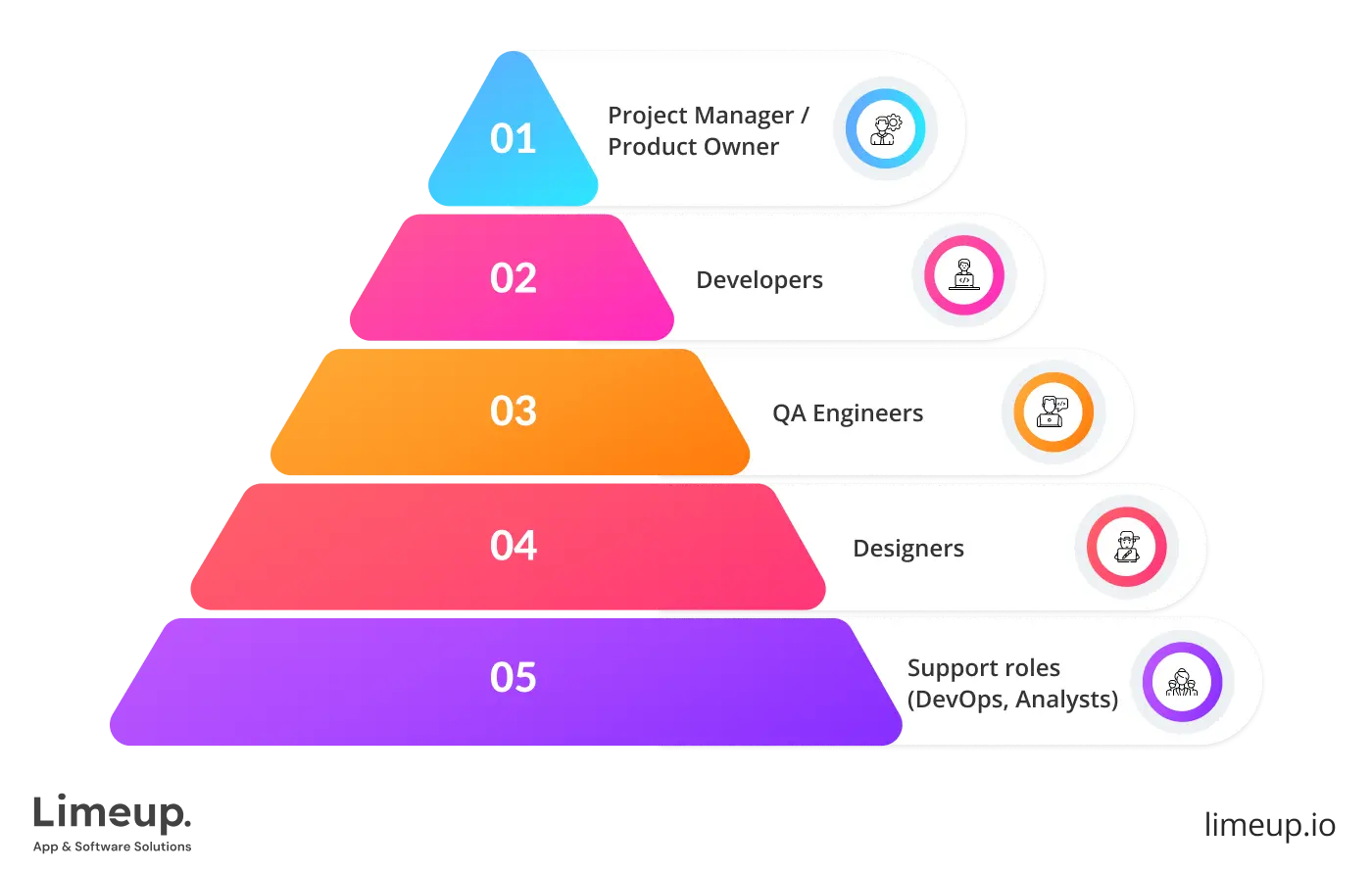
- Who will be the key members of the project team, and what are their roles?
- What is the team’s experience with healthcare-specific software or compliance projects?
- How do you handle resource scaling if the project scope expands?
- How frequently will you provide project updates or demos to stakeholders?
- How do you manage cross-functional collaboration between developers, designers, and QA specialists?
Questions about post-launch support
Software for healthcare is a dynamic system that changes in response to new laws, advancements in technology, and user needs. When comparing, verify that the vendor provides post-launch security upgrades, performance monitoring and ongoing maintenance.
- What kind of monitoring and maintenance do you offer after launch?
- How do you respond to new compliance requirements when it comes to software updates?
- Do you provide Service Level Agreements (SLAs) for problem-solving and response times?
- How can data security and continuity be guaranteed after deployment?
- After release, is your team able to offer continuing technical support or product enhancements?
These questions will assist you in gauging the medical software development agencies’ expertise, procedures and dependability. A comprehensive discussion is the one that would see your selected partner not only develop software that works but also fits into clinical workflows, governing rules and long-term objectives.
Looking for UK-based medical software development services?
Every hospital workflow is a puzzle, and software is the piece that makes it fit perfectly. Our research compared the top 10 UK medical software developers across proficiency, team scale, tech stack, project portfolio and pricing, giving you a clear perspective for selection. Conformity, productivity and patient satisfaction are all linked when you work with competent medical software development firms.
Reach out to Limeup to hire UK medical software providers who understand healthcare from both a technical and clinical perspective. With our help, your next project will be able to enhance the accuracy of treatment and save precious time in your clinics.
FAQ (choosing & comparing)
What factors should I consider when selecting a medical software vendor?
Consider the healthcare experience, project portfolio, technical skills and scalability of the supplier, their attitude to usability and patient-centred design. Reliability and quality of delivery can be measured by checking references and a review of customers.
What is the best way to evaluate multiple medical companies?
A methodical approach guarantees that you make an informed decision when comparing several UK medical technology partners. To properly compare choices, take the following actions:
- List your candidates.
- Outline clear appraisal metrics.
- Gather data.
- Create a comparison table or matrix.
- Consider additional factors.
- Analyse and shortlist.
What affects the price of hiring a MedTech agency?
Costs vary depending on project complexity, technology stack, team size, and level of customisation. Integration with existing systems, use of AI or IoT, and cloud scalability can increase budgets. Additional factors include ongoing maintenance, regulatory compliance, and post-launch support.
Are certifications important for UK healthcare software vendors?
Yes. Qualifications like ISO 9001, ISO 13485 or HIPAA compliance show the quality, security and industry best practice of a UK healthtech vendor. Among other things, compliance helps to reduce risk to your organisation and patients as it ensures your software is compliant with regulations.


